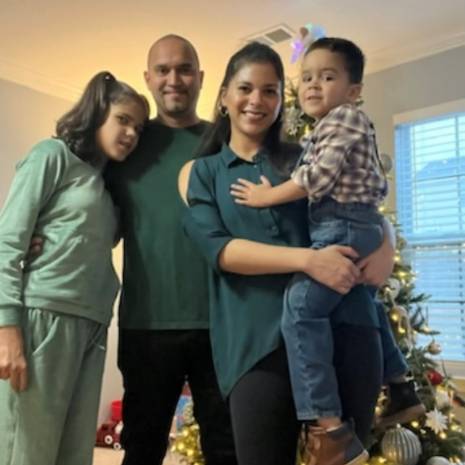NIH-funded peer mentoring program provides support and coaching to parents of children on the spectrum.
If their child falls off a bicycle and skins a knee or breaks a bone, parents usually know what to do or where to go for help. If their child is diagnosed on the autism spectrum, the next steps might not be as obvious.
A five-year study being conducted by Robert Hock, a professor in the University of South Carolina’s College of Social Work, aims to help families navigate that journey. The NIH-funded Autism Parent Navigator Program connects parents of newly diagnosed children with parents who have already experienced the maze of decisions for families with children on the spectrum.
“It can be a time of transition and confusion,” Hock says. “We hope families come away with a map for next steps, so that it’s less scary and confusing, and they feel their families are set up for continued development over the years. “
The program offers structured training to provide support and coaching through one-on-one work with caregivers. By default, one person often takes charge of researching and finding services and resources. They then become responsible for educating everyone else, and it can be overwhelming.
“Our program works with two caregivers, whether it’s a married couple or a mother-daughter or some other caregiving team, to get them both on the same page,” Hock says. “We focus on service delivery and educating about autism, but we also focus on teamwork skills, communication and decision making because disagreement between caregivers can cause a big delay in services.”
The program also helps address the challenges of a shortage of autism providers by empowering caregivers to help other caregivers through the journey. Recruitment for the study was recently closed with 182 participating families from 40 counties in South Carolina and seven counties in North Carolina. Children in the study range in age from 18 months to 8 years and are the first in their family to receive an autism diagnosis.
Families are randomly assigned to one of two groups. The Autism Parent Navigator Program offers six sessions of structured content that includes skill-building activities and a workbook. The other group receives parent-to-parent support primarily over the telephone. Hock’s study compares the effectiveness of the two programs.
Feedback has shown participants appreciate the support for caregivers as a team and learning about available resources and providers. They felt empowered by the one-on-one support.
“They talk about how the program helped them realize that they are a team and how it gave them techniques for opening up and working through things together,” says Abigail Mojica, program research coordinator.
Mojica’s daughter and son are on the autism spectrum. She and her husband participated in the study’s pilot program about 10 years ago. She joined the research team in 2023.

As a participant in the study, Mojica appreciated having both caregivers involved.
“It's really easy for one person who might have more time or more experience to take the lead, make all the calls and go to the appointments,” she says. “It was really important that we were both making time to be present to connect over this experience and go through it together in a way that wasn't just about appointments.”
By being able to talk about the impact on their family and their marriage, Mojica says she and her husband came out of the process a lot stronger: “It was so nice not to feel alone or different by talking with someone who was going through a similar experience.”
Outcomes are measured using a videotaped play session between both caregivers and the child and through a series of questionnaires. The goal, Hock says, is to build caregiver mental health and social support, reduce relational conflict, connect families with appropriate services, and improve child functioning and behavior.
“We go back to the things we learned about the co-parenting relationship to communicate what our expectations are and what the kids’ needs are,” Mojica says. “Working together and presenting a united front benefits the kids because they aren’t caught up in differences in our parenting style or in differences with how we want to approach services.”
Hock credits partners at USC and in the community with the development and success of the program. Family Connection of South Carolina helped develop and test the program and provided feedback on the curriculum.
More than 70 referral partners supported recruitment efforts. The Early Social Development Lab and psychology professor Jessica Bradshaw have helped provide 64 free autism evaluations. Dr. Mark Feinberg at Penn State is also a principle investigator on the study.
USC students, too, have contributed to the program in roles such as screening interviews, entering data or helping to develop recruitment materials in addition to student-led research projects and an independent study about adapting mental health practices for autistic adults.
In addition to participating in community events such as National Night Out, Sensory Night at Edventure, Accessibility Morning at the S.C. State Museum, and most recently an Autism Connect event at USC’s Pastides Alumni Center, the lab has also hosted community events for families of children with autism including an Inclusive Family Play Day, as well as in person and virtual parent support groups.
“We have delivered 953 hours of direct support to families, and while we can't say definitively yet, our evidence looks promising there will be real results for families,” Hock says. “Once we get confirmation from the data, we want to look at creating a blueprint to launch similar programs beyond South Carolina. Our team is not going to stop when the study stops. We're going to keep working to make changes that will improve outcomes for children and offer support for caregivers.”